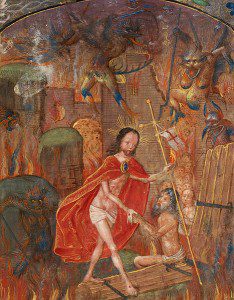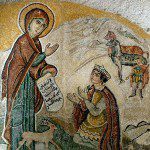![God as Architect/Builder/Geometer/Craftsman, The Frontispiece of Bible Moralisee By Anonymous (archiv.onb.ac.at), via Wikimedia Commons [Public domain]](https://wp-media.patheos.com/blogs/sites/637/2016/07/God_the_Geometer-219x300.jpg)
In it, we are told God gave Adam and Eve a garden of delights. They were free to eat anything within it they wanted except from the tree of the knowledge of good and evil:
And the LORD God commanded the man, saying, “You may freely eat of every tree of the garden; but of the tree of the knowledge of good and evil you shall not eat, for in the day that you eat of it you shall die” (Gen. 2:16- 17 RSV).
As is often the case, that which is forbidden becomes a thing of desire, and from the desire stemmed the foundation for temptation. Adam and Eve had the option to obey God, but, through the contrivances of the devil, they would disobey him, take the fruit of the tree of knowledge of good and evil, and eat it. Thanks to their sin, their whole way of life changed, as they entered into a fallen mode of existence which could be said to be a “spiritual death” because they let their spiritual nature be overturned by their sensual, physical nature, allowing their carnal desires have transcendent authority in their personal lives. But what exactly was their sin? Some saints, especially within monastic communities, suggested that the first sin was an act of gluttony, because their physical form gave them the desire to eat more than was necessary or good, and so they could be said to have overeaten, taking into themselves an excess of food and so became fallen by their stomachs.[1]Others suggested it was envy, that the temptation of Satan was for Adam and Eve to eat of the tree of knowledge of good and evil because he claimed it would make them like God, whom they envied. Pride, certainly, is thrown into the mix, because Adam and Eve were led to believe they could be like God, as great as God, and so they looked down upon themselves in the same pride which Satan is said to have possessed, leading them to turn away from God and unto themselves. We can see how these and other answers do not have to be seen as exclusive of each other but rather can and often do connect together as one root sin which is then logically divided by us: disobedience of God in action creates an unhealthy division in nature which rips apart that which is united, with sin itself, having no nature of its own, finding itself divided in this fashion.
The basic result of their disobedience is well known. Adam and Eve were kicked out of paradise and found themselves cut off from the grace of God. Of course, it must be noted, they were not entirely cut off from God; human nature was wounded, but not completely destroyed. And so, though their mind is confused and they “hide” themselves from each other and God by putting on “skins,” they still were able to walk with God and talk to him, even to be prophets for him as God revealed to them his long term plan to conquer Satan through their progeny.
But what is important for us here is to reiterate that there was a change in the modality of human existence as a result of the fall. The pure, natural way of engaging the world which allowed truth to be known as one holistic truth without the need for deliberation, was lost. Now, humanity has to explore the world, not in communion with God and the wisdom such unity with God provides, but with a new, dualistic way of engaging the world grounded in ignorance. The tree of knowledge of good and evil provides knowledge based upon dualistic forms of thought which requires speculation, abstraction, and experimentation in order to acquire new pieces of knowledge; to be wise in the way of the world is to accumulate several pieces of knowledge, but not to be engaged with the transcendent truth in a way beyond discursive thought. We see, therefore, Adam and Eve grew wise in the way of the world as their dualistic form of knowledge took over:
So when the woman saw that the tree was good for food, and that it was a delight to the eyes, and that the tree was to be desired to make one wise, she took of its fruit and ate; and she also gave some to her husband, and he ate. Then the eyes of both were opened, and they knew that they were naked; and they sewed fig leaves together and made themselves aprons (Gen. 3:6-7 RSV).
Their eyes were opened and they began to look into the world, no longer with their full faculties, with their spiritual senses, but only with bodily senses, where then they began to collect data about the world which they would then use in a dualistic fashion. That is, they look at the world in atomistic fashion, cutting it up into small parts which are then collected together to establish various forms of knowledge. What is known is not known as a whole, but only in part, because much is hidden from us as we engage it in such dualistic perception. The tree of knowledge of good and evil was the knowledge which divides the world into incomplete parts which are then pitted against each other, creating dualistic inferences such as good and evil, male and female, spirit and body, life and death, and the like. This is how and why the fruit of the knowledge of the tree of good and evil, dualistic knowledge, is said to lead to death — because death itself is formed out of life and becomes set up in opposition to life. To know good and evil is to know death, to enter the stream of change where we live in part and die in part on every day of our existence.
This wisdom of the world is found in the accumulation of pieces of information, the division of knowledge into such pieces being indicative of how dualism has set in and deconstructed the truth in its own image. t has been divided because of sin. The more knowledge we accumulate, the smarter and wiser a person appears to others. And yet, no matter how much knowledge is collected in this fashion, there will be an infinite number of pieces not known, showing the ignorance which is the root of this worldly wisdom. We collect information to displace the emptiness in our minds, but in doing so, we find the holes are infinite and our knowledge is limited, and so our end result is to remain ignorant no matter how learned we have become.
This, then, is how and why we do not truly know God as he is in accordance to worldly wisdom. He transcends the parts which we construct in the world, and if and when we encounter him, we try to make him a part of our worldview, making as a result, a representation of God which is far off from who and what God really is. But whatever we can come to know of him in this fashion, we must realize why it fails to attain to him and also why many, because they are exploring the truth in the blindness of their dualistic reasoning, can even pass him by and not notice him and so think he is not real. What we know of the truth, and so of God, comes to us in and through our bumbling exploration of the real divided into parts due sin’s deconstruction of our experience of being. We certainly can add, and do add, indirect knowledge through the experience and inferences of others, but such secondary additions add little in comparison to the totality which we do not see or know. What we get is a small portion of the truth, and so God is easily lost in this portioning off of the truth, to be found in those divisions of being which we have not yet experienced. The wise men and women of the world will know a lot – but so long as they remain caught in the trap of dualistic thought and think it is what wisdom is about, they will lose out in true knowing; whatever they believe about God is at best opinion and not real knowing. Paul, therefore, rightfully portrayed the wisdom of the world as foolishness, while the proper way of knowing God, which comes from a form of knowing outside of deliberative and speculative reason, will appear to be foolishness to the world:
For the wisdom of this world is folly with God. For it is written, “He catches the wise in their craftiness,” and again, “The Lord knows that the thoughts of the wise are futile.” (1 Cor. 3:19-20 RSV).
All philosophical debates, all our typical ways of exploring the world in and through our dualistic form of intellection, will lead to nothing. The ignorance which remains after all we have accomplished in our attempts to come to know the truth through such discursive thought will be infinitely greater than the little portions of the truth which we have attained. Even if and when we write down all that humanity has discovered of the truth through such dualistic forms of inquiry, the knowledge which is revealed will still be shown to be as nothing in comparison to what is not known. This is how and why we know the way of wisdom established by the fallen mode of existence which we are so used to will lead nowhere, but coming to terms with this will help us have a learned ignorance which will then tell us we need to change our way of existence if we want to know the truth. Recognizing our unknowing is the foundation by which true wisdom can be pursued, but even then it will require a leap of faith because of how foolish we will appear to those who follow the worldly path of wisdom. We must toss aside our dualistic form of thought and see that which was prior to it, the non-dualistic wisdom which transcends all ignorance, the wisdom which is the wisdom of God. And so, we, with Paul, must be willing to look like fools, to preach what is foolishness, in order to point to the wisdom which has otherwise been lost:
Where is the wise man? Where is the scribe? Where is the debater of this age? Has not God made foolish the wisdom of the world? For since, in the wisdom of God, the world did not know God through wisdom, it pleased God through the folly of what we preach to save those who believe (1 Cor. 1:20-21 RSV).
The problem is that we sin, and so long as we sin, we will not be able to know the truth. Why? Sin disrupts our understanding because of its negative quality, where it creates more and more divisions, breaking things apart into more and more pieces, as it seeks to destroy being itself. The further entrenched we are in sin, the more our way of knowledge will be influenced by sin; we can be smart, indeed of great, remarkable intellect, and know a lot, but because of the veil of sin on our intellect, we will not come to know but only come to have a large accumulation of facts and opinions which we examine and use to theorize on the nature of the truth. As long as sin taints us, we will not know the world as it is. We will see the world encased by the shadow of sin, divided up and cut apart through its deconstruction of being.
And so, we come into the world tainted by sin, experiencing the world not in accordance with nature, but in accordance to the sub-natural existence established by sin. We search for and experience the truth, and act in accordance to what we know, that is, we will in a gnomic (deliberative) form of willing instead of the natural and good will found in the original face of humanity. In our fallen mode of existence, our actions are based upon deliberation and guesswork, and since dualistic form of knowledge is fundamentally ignorant, that ignorance makes sure our deliberation will contain various faults and flaws in it.

In the incarnation, God restored the original face of humanity, its original integrity with its original way of knowing beyond all dualistic thinking. Jesus, God and man, knows as both God and man; he is fully human with a human will and a human intellect, but we find his will and intellect is not touched by sin and so his way of knowing and acting differs from ours.[2] He knows in a non-discursive, non-dualistic fashion, and so he wills naturally, without deliberation, because he knows in a holistic fullness, a oneness does not contain the ignorance founded by the dualism of the tree of worldly knowledge. He does not will by a mode of deliberation based upon gnomic choices, but he acts in accordance to nature, in volition and not compulsion, where he goes from good to good, based upon the way he knows the truth in a natural, holistic fashion. This, then, is the point St. Maximus the Confessor made when he described how Jesus willed as a human:
Thus, those who say that there is a gnomie in Christ, as this inquiry is demonstrating, are maintaining that he is a mere man, deliberating in a manner like unto us, having ignorance, doubt and opposition, since one only deliberates about something which is doubtful, not concerning what is free of doubt. By nature we have an appetite simply for what by nature is good, but we gain experience of the goal in a particular way, through inquiry and counsel. Because of this, then, the gnomic will is fitly ascribed to us, being a mode of the employment [of the will], and not a principle of nature, otherwise nature [itself] would change innumerable times. [3]
The key is for us to understand what Jesus in his humanity is what humanity is supposed to be, acting and living in accordance to the way things are, knowing them as they are without any dualistic conceptions and false impositions placed upon the world causing doubt and confusion. What Jesus is, in his humanity, is what we are to become when we are freed from sin and all its taints, thanks to grace. “And we all, with unveiled face, beholding the glory of the Lord, are being changed into his likeness from one degree of glory to another; for this comes from the Lord who is the Spirit” (2 Cor. 3: 18 RSV).When concupiscence is itself no longer a problem because we have become natural in our willing and know in a way beyond discursive reasoning, we too shall act without compulsion and naturally do what is good and virtuous, knowing it is the right thing to do without doubt, because there will be no decay in our intellect which creates the evil that splits wisdom up into dualistic knowledge of good and evil.
The purification needed for this to happen, a purification which is fueled by the fire of God’s love given to us in grace, begins in our life here, and if we have not completed such purification, will continue with us in the afterlife; the more we cooperate with it, the more we can find ourselves coming to know and act in a transcendent, non-gnomic fashion; the whole purpose of asceticism, for example, is to cleanse us of the impurities of the fall, and the fallen mode of willing, so that we can begin to see and know and act with the natural virtue which lies hidden under the dualistic mode of being, as St Maximus also explained:
Asceticism, and the toils that go with it, was devised simply in order to ward off deception, which established itself through sensory perception. It is not [as if] the virtues have been newly introduced from the outside, for they inhere in us from creation, as hath already been said. Therefore, when deception is completely expelled, the soul immediately exhibits the splendor of its natural virtue.[4]
As we open ourselves to Christ, we join ourselves in him, finding he is helping us to eliminate from ourselves all the barriers we have put in place that closed ourselves off from God. The more we find ourselves overturning the dualism which separates us from him, the more we will see the effects of our unity will change us from within. We will keep his commandments in love, not because of compulsion, but truly because we will be like him:
And by this we may be sure that we know him, if we keep his commandments. He who says “I know him” but disobeys his commandments is a liar, and the truth is not in him; but whoever keeps his word, in him truly love for God is perfected. By this we may be sure that we are in him: he who says he abides in him ought to walk in the same way in which he walked (1 Jn. 2:3-6 RSV).
Death, which sin established as the opposite of life, the death which we died the day we sinned, finds itself overturned in life. The dualism established by the tree of knowledge of good and evil is transcended by the tree of life. In our unity with Christ, we will perceive and come to know the unity of life and death itself. Jesus, the author of life, took death upon himself and made it one with himself, reshaping it to be a part of life itself. This is how he become victorious over death, for he has made death itself a means by which we come to him, the author of life, and able to once again find unity with God.
[1]Fasting, in this fashion, is said to serve as a way to overcome this root vice.
[2] Clearly, confusing our fallen mode of willing and knowing as being the normative means of human willing and knowing is the foundation for one early Christological heresy, that of Apollinaris. He rightfully did not want to see Jesus as being deluded, but because he only knew knowledge in the deluded form and not the higher, proper way of unfallen humanity, he had to cut off what was properly human from Jesus, leading to an imperfect and heretical understanding of the incarnation.
[3] St. Maximus the Confessor, The Disputation with Pyrrhus of our Father Among the Saints, Maximus the Confessor. trans. Joseph P. Farrell (Waymart, PA: St. Tikhon’s Seminary Press, 1990),31-2.
[4] ibid., 33-4.
Stay in touch! Like A Little Bit of Nothing on Facebook:
A Little Bit of Nothing













